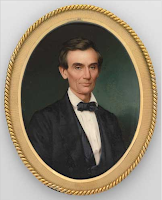The Lincoln Heritage Museum will be hosting a 10-year anniversary remembrance of the September 11th attacks on Thursday, September 8, 2011 at the museum, which is located on Lincoln College’s campus in Lincoln, Illinois. The remembrance program is free and open to all ages.
The program, set to begin at 7 p.m., will feature remarks from Vicki Selvaggio of Springfield, who donated a United Airlines flight attendant’s jacket to the museum in 2002. Selvaggio was wearing the flight attendant’s jacket on layover in New York City on the morning of September 11, 2001.
The program will also include the music of Steve Scaife, a member of the St. Andrews Pipe Band, who will perform several solemn selections. Michelle Fletcher of Lincoln will read her moving poem that she wrote in honor of the victims of the attacks.
The Lincoln Heritage Museum is in possession of several historical pieces with relevance to September 11th, most notably a piece of Tower One of the World Trade Center, which was donated to the museum by the City of New York in 2002. The piece from Tower One has attracted numerous visitors since its arrival.
Following the acquisition of the Tower One piece, the John Chan family of Peoria donated to the museum several items related to their son, Chip, who died in Tower One.
New York Governor George Pataki also donated the address which he gave to the New York state legislature following the attacks, which remains the only copy of the address in any public or private hands.
As a show of solidarity, the Lincoln Cathedral in Lincoln, England sent a letter of sympathy to Lincoln, Illinois.
Those items on exhibit can be viewed following the program.
For more information, please contact the Lincoln Heritage Museum at 217-732-3155.


